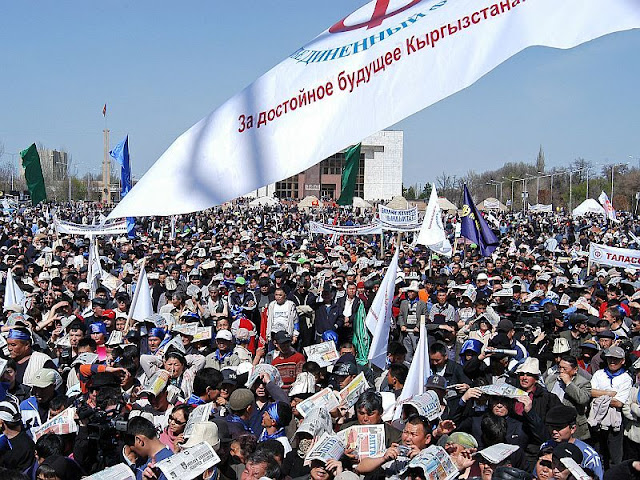Kyrgyzstan is facing major problems after the outbreak of riots and the ousting of president Kurmanbek Bakiyev earlier this month. David Michael Barnwell speaks with Dildora Hamidova, a 27-year old Kyrgyzstani, about the outlook of the crisis.
Trouble in Bishkek
On April 7th a series of violent riots broke out in the former Soviet Republic of Kyrgyzstan. Armed protestors stormed government buildings and TV stations in the capital of Bishkek, forcing President Kurmanbek Bakiyev out of office and leaving the nation on the brink of civil war.
An interim government has since been installed but many questions remain unanswered. The conflict now points to the difficulties of tying together an immensely diverse nation, tucked into the Central-Asian tundra between giants like Kazakhstan, Russia and China.
The Kosmo spoke with Dildora Hamidova, project coordinator of the Center for Multicultural and Multilingual Education, an NGO based in Osh in southern Kyrgyzstan about the uneasy situation, its background and possible implications.
Hamidova, a 27-year old Uzbek Kyrgyzstani, said that the riots started with growing concerns about the nation’s energy supplies and general dissatisfaction with the state of democracy in the country.
“The first riots started in the northern parts of Kyrgyzstan, in Naryn. They then moved to the Talas oblast and the capital. The mood of protests has since been spreading all over the country. The population is unsatisfied with the high raise of energy, gas, water taxes, low living standards, and mainly the democratic governance of the country” Hamidova stated.
A struggling democracy
 |
| Former President Kurmanbek Bakyiev |
A struggling democracy
The democracy in Kyrgyzstan can be described as struggling. Patron-client relationships are common, and political power often runs along the lines of family and tribal ties.
When President Bakiyev took over office in 2005, he promised to rid the nation’s political scene of corruption and nepotism, but he has since failed to live up to his promises.
“The Bakievs administration became very corrupt and marred by nepotism. President Bakayiev’s son, Maksim Bakyiev, was put in charge of a new development agency, which greatly influenced on country’s economy. Bakayiev, his son and his brothers were basically ruling the country on their own” Hamidova said.
The ousted president has since the breakout of the protests sought to mobilize support in his home region in the south of the country, underlining the immense importance of regional and ethnical ties in the unsettled country.
“On 15th of April ex-president Bakyiev came with his brothers to the southern capital of the Republic, Osh, in order to drum up support from the local population. The news that Bakyiev was hiding in his native village [in the south], seeking support of his relatives and kin made the local population panic.”
The tensions between Bakiyev’s friend’s and foes are potentially ethnically fueled, and often determined by close ties to families and tribes. This means that while an interim government have promised to bring back law and order, this might only apply to the Northen regions, where the government stronghold is based. Elsewhere, official influence could be less visible.
“Clan and tribal politics are still very important in Kyrgyzstan, and this has only aggravated the whole situation” Hamidova said.
“It’s an upsetting prognosis, perhaps the start of civil war if Bakiyev’s kin do not tone down their claims for regaining the power”.
Fear of ethnic tensions
Fear of ethnic tensions
With various parts seeking to seize the moment and secure political influence in one way or another, tensions are still high in the many the corners of the truly multicultural Kyrgyzstan.
Meanwhile, the ousted president himself may also still be contemplating a comeback.
“He left to Kazakhstan with Turkey or Pakistan probably being his final destination. There are rumors that he has good ties with extremist groups”.
The outbreak of violence points to an inherent problem within Kyrgyzstan, which hosts as many as 80 ethnic minorities in an area the size of Portugal.
The interim government installed is headed by former foreign minister Roza Otunbayeva. But whether she or a successor in the presidential seat will manage to fulfill the difficult task of settling the nation’s many interests is still largely unclear:
“There is fear that ethnic tensions will break out. There are no guarantees that the interim government can protect the interests of ethnic groups, for example Uzbeks living in southern parts of the country. Many Russians will certainly leave the country. There is no security for them, no hopes for a better future, no perspectives.” Hamidova said.
Echos from the past
 |
| A Kyrgyzstani boy poses for the camera |
It is not the first time Kyrgyzstan experiences a faceoff with a corrupt regime. In 2005 former President Akayev was forced out of office in the so-called ‘Tulip Revolution’, which also saw the breakout of violence and looting in especially the capital of Bishkek.
Back then, promises were made and hopes were high for the future of the nation.
With the recent developments and the departure of Bakayiev this early optimism is however long gone. Instead the Kyrgyzstani now again face the difficult task of solving a deepening political crisis which continues to echo the nation's troubled past.
“Unfortunately no lessons were learnt from Akayev’s previous regime. It is very upsetting that people think that everything can be solved by means of corruption, force, violence, riots with lootings and evading the law. There are many concerns. Right now I do not feel that optimistic about it”.
Kyrgyzstan has 5.5 million inhabitants of which the majority are ethnic Kyrgyz. Other groups include Russians, Tatars, Tajiks, Kazakhs, Uzbeks and Ukrainians. The country was incorporated into the Russian Empire in 1876 and gained its final independence from The Soviet Union in 1991.
(Images: Creative Commons)
(Images: Creative Commons)











